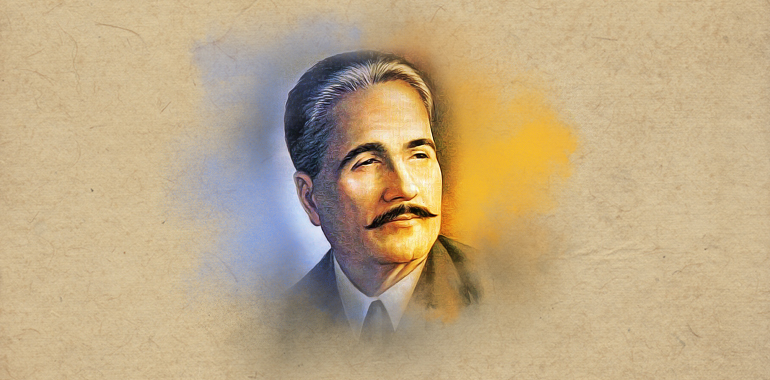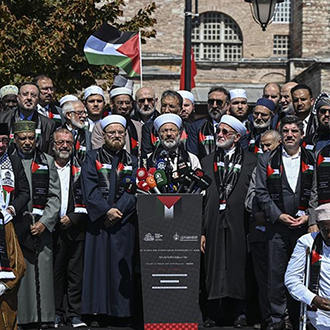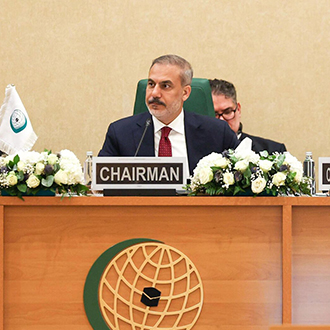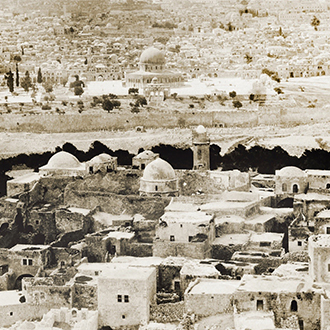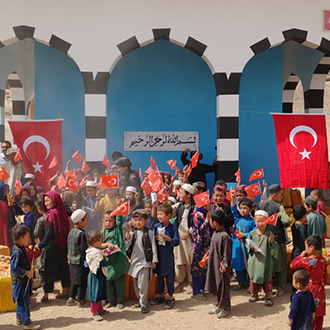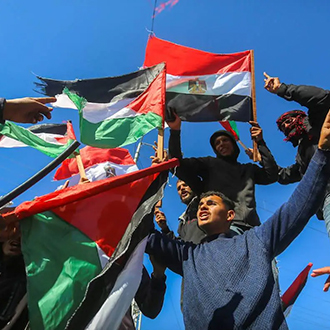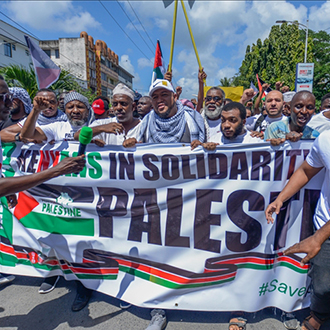The nation was divided into two as a result of the throne wars that broke out once more in 1707. The capture of Delhi by the Iranian ruler, who wanted to take advantage of this, and then the Afghan ruler's invasion of India, led to political chaos. The British started to control India after defeating the Mughal armies at the Battle of Buxar in 1764. With the 1766 Treaty of Allahabad, British dominance increased. The British—who put down the Indian Rebellion led by Muslim Indians in 1857 wanting to end British domination—overthrew the final Mughal Emperor Bahadur Shah II in 1858, ending the Turkish-Islamic rule in India and giving the British Empire control.
So when Muhammad Iqbal was born in India in 1877, it was under British colonization.
Muhammad Iqbal’s self-construction
Iqbal’s father was a Sufi. Both his father, Nur Muhammed, and his mother, Imam Bibi, were significantly influential in the development of his piety. After receiving his basic education in Sialkot, he took philosophy and law courses at the Government College in Lahore in 1895. The influence of two key figures on Iqbal during his formative years would also determine the path he would take as a poet and thinker. These people are Mevlana Mir Hasan, and the other is his Western teacher, Thomas Arnold. Arnold noticed Iqbal’s talent and had him attend Cambridge University.
In Cambridge, Iqbal met renowned Hegelian philosopher McTaggart and psychologist James Ward. Under the supervision of these important teachers, he studied philosophy. Meanwhile, he established close ties with a number of prominent orientalists. After completing his studies at Cambridge in 1907, he traveled to Munich, where he earned a doctorate in philosophy with his work “The Development of Metaphysics in Persia,” which he completed under the direction of Fritz Hommel.
Iqbal returned to Lahore and spent two years teaching English and philosophy at Oriental and Government colleges. Although he mostly made a living as a lawyer, he was looking for answers to issues facing Muslim societies.
In the 19th and 20th centuries, there were generally two tendencies in colonized Muslim countries: The first trend was the view that it was impossible for Muslim nations to stand against Western civilization with their own identities but that they could exist by becoming unconditionally Westernized. The intellectuals who followed this path were expressing their belief that every political and cultural concession should be made to the West. The second trend was a defensive approach. Those who argued that the West was the cause of all the troubles in the Islamic lands tended to reject anything that would come from the West. They believed that this was the only way to be protected from the harmful effects.
Neither of these views could repair the damage caused by modernism and colonialism, which Muslims were faced with. Muhammad Iqbal correctly assessed the situation and proposed a new path for both the Indo-Islamic community and all Muslims worldwide.
First of all, Iqbal had reached a brand new synthesis as a Muslim intellectual who both received religious education and studied philosophy in the West. He evaluated together the mystical view of the renowned sufi Rumi, the views of great Muslim jurists, and the thoughts of Western philosophers such as Hegel, Bergson, and Nietzsche. Thus, his method of thought integrated Eastern and Western influences without compromising the basic principles of Islam.
Suggestions for solutions to the problems of Muslims
Iqbal conveyed the synthesis of his ideas formed through his intensive education during the analysis of practical events. The starting point of his thought process was to be aware of the problems faced by Muslims who were dealing with modernism and colonialism. Because only Muslims who were aware of this could respond to the West in both the political and social spheres.
However, Iqbal thought that both his Muslim-Indian community and other Muslim societies were unsuccessful in this regard. Because there was a severe pacifism among Muslims in those days. That was the biggest source of problems. Iqbal placed the blame for this complacence on the Muslims themselves. The Muslims had not been able to fulfill the duty given to them by Allah to be His caliph (Khalifatullah fil-Ardh–Allah’s deputy) on earth. Therefore, they lacked the dynamism to respond to the West. The reason for the current situation was not only the power of the West but also the lack of awareness of Muslims in the political arena, their falling into sectarian fights, and their lack of action. So what should Muslims do? What took Iqbal beyond the role of beloved poet with his passionate poems that inspired millions and also made him the spiritual father of Pakistan was the model he offered to Muslims.
What should the ideal Muslim society be like?
According to Iqbal, the ideal Islamic society, namely the Ummah, is a community consisting of individuals with the same consciousness. The only role model in this society is the Prophet Muhammad (saw). In short, the Muslim society is a society based on freedom, equality, and fraternity that sees the Prophet Muhammad (saw) as its perfect example and takes the belief of tawhid as its center. As a role model, the Prophet Muhammad (saw), both as a prophet and a statesman, showed Muslims what needed to be done in his life.
The ideal society he described was not a stagnant ideology but a model that was firmly entrenched in the basic principles of the Quran and Sunnah al-Saniyyah but could also be adapted to the changes and advances of the time.
This is a unique society. Because the ideal Islamic society, which is based on absolute equality, actually contains the core values of democracy. But this was not the understanding of democracy modeled by the West, which had its origins in ancient Greece. This was a unique understanding of democracy that came from the essence of Islam.
For Iqbal, democracy was the best form of government in terms of allowing the individual to emerge. With this feature, it was much better than the aristocracy, which prevented individuality. When he looked at Muslim Indian society, he saw sectarianism and the caste system, which he thought were worse than in Hindu society. For this reason, Muslims’ preference for democracy would enable them to rise again. However, emphasizing that democracy is not only a pragmatic form of government, Iqbal argued that the roots of this system are in Islam itself. In fact, according to Iqbal, the model of the small Muslim society, operating largely on the basis of equality and unity, had manifested itself in the early years of Islam, during the time of the Prophet Muhammad (saw) and his companions.
However, Iqbal saw education as the most important foundation for establishing this order. He thought that the way for Muslims to establish such an ideal society and to revive the Islamic civilization was through a solid education. Democracy was a vision that only Muslims educated enough to know what they were voting for could survive. Thus, through education, a strong-willed and conscious Muslim model would emerge. Iqbal, with the influence of the German philosopher Nietzsche, cared about the concept of Ubermensch (the superior man). Of course, his intention here was to emphasize conscious and strong-willed people, not race. This corresponded to the Sufis’ concept of “al-insan al-kamil”. Iqbal, who named this model “merd-i Hüda” in his own language, especially focused on Rumi's concept of “al-insan al-kamil”.
The road to the founding of Pakistan
Muhammed Iqbal was not just a theorist. He took part in daily politics without compromising his principles. He joined the National Freedom League in Lahore in 1924 and was elected to the Punjab Legislative Council in 1926. He became an active member, talking about land incomes and taxes and advocating compulsory education and better health care for the villages.
The idea of Islamic unity, which is clearly seen in Iqbal’s writings, goes hand in hand with his national liberation activities. But Iqbal had a road map. The Islamic nation would come after anti-colonialism, the liberation of India from being a British colony, and giving the Muslim Indian society an independent state. According to him, the Islamic nation is a community of Islamic countries that has achieved political and cultural independence and has strengthened its internal structure.
As part of his political activities, Iqbal was elected president of the Islamic Union in 1930 and put forward his dream of Pakistan in his presidential speech. He attended the second and third roundtable meetings on the future of Pakistan held in London in 1931 and 1932, respectively. Thus, Muhammad Iqbal joined the politics of his country and guided his people with the responsibility of a Muslim intellectual. His thought on the subject was: “Politics is to work, and to invite to dignity and honor.”
Muhammed Iqbal passed away on April 21, 1938 and did not live to see Pakistan gain its independence on August 14, 1947. However, with the poems he wrote, he had a great influence on the establishment of Pakistan, with his ideas suggesting that Muslims should be conscious and eager.



